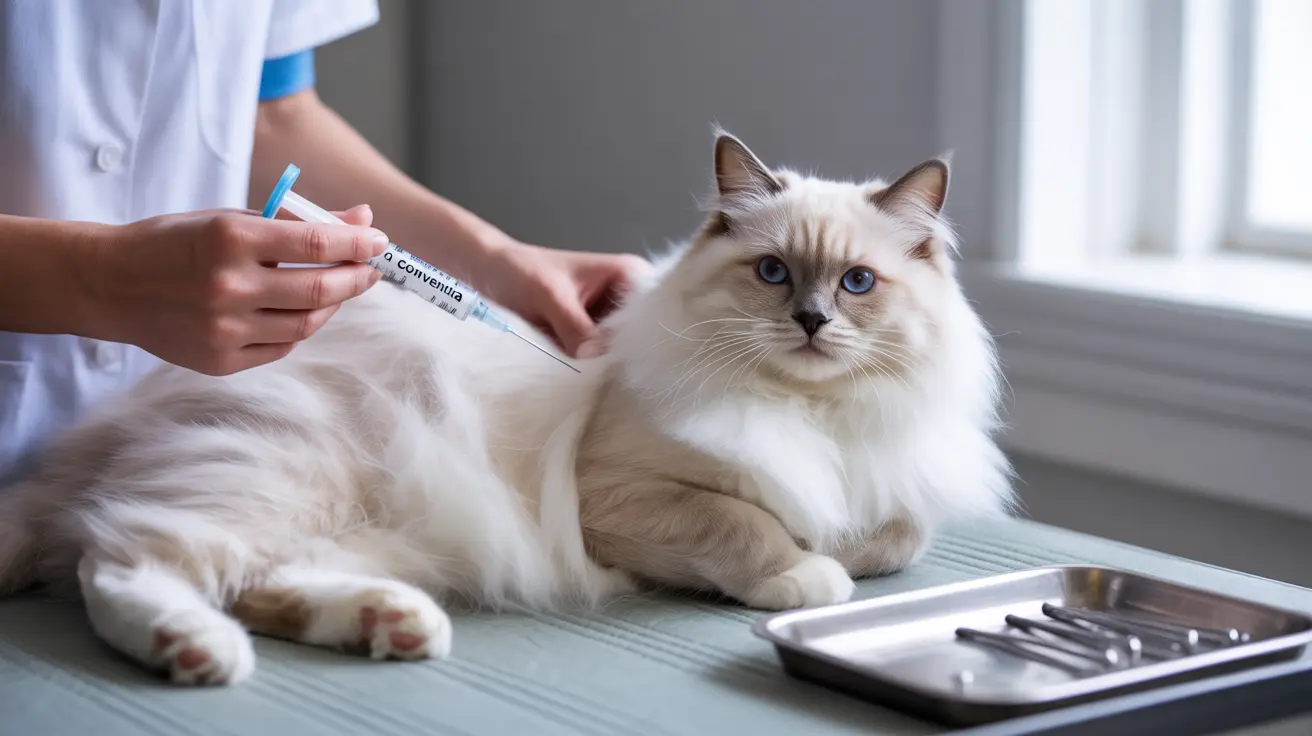What is Convenia and How Does It Work for Cat UTIs?
Convenia (cefovecin sodium) is a third-generation cephalosporin antibiotic specifically designed for veterinary use. When administered via injection, it provides continuous antibiotic coverage for up to 14 days, making it particularly effective for treating feline urinary tract infections.
The medication works by targeting and destroying harmful bacteria commonly responsible for UTIs in cats, such as Escherichia coli. Unlike traditional oral antibiotics that require daily dosing, Convenia's unique formulation allows it to bind to plasma proteins, releasing slowly over time to maintain therapeutic levels.
Benefits of Convenia for Feline UTI Treatment
One of the primary advantages of choosing Convenia for cat UTIs is its convenient administration. A single injection by your veterinarian replaces what would typically be weeks of oral antibiotics, eliminating the stress of daily medication struggles with your cat.
Clinical studies have shown that Convenia is as effective as oral antibiotics for treating UTIs, with success rates reaching over 75% for eliminating common bacterial infections. This makes it particularly valuable for cats that are difficult to medicate or for owners with challenging schedules.
Treatment Protocol and Duration
When treating UTIs, veterinarians typically administer Convenia at a dose of 8 mg/kg of body weight. The injection is given subcutaneously (under the skin), and most cats tolerate the procedure well. The antibiotic begins working within hours, though you may not notice improvement in your cat's symptoms for 2-4 days.
The 14-day duration of action ensures consistent antibiotic levels throughout the treatment period, which can be crucial for completely eliminating the infection and preventing recurrence.
Safety Considerations and Potential Side Effects
While Convenia is generally safe for most cats, it's important to be aware of potential side effects. Common reactions may include mild injection site discomfort, temporary lethargy, or digestive upset. More serious but rare side effects can include allergic reactions, particularly in cats with known sensitivity to cephalosporin or penicillin antibiotics.
Your veterinarian will carefully evaluate your cat's health history and current condition before recommending Convenia, particularly if your cat has kidney problems or other underlying health issues.
Frequently Asked Questions
How effective is Convenia for treating urinary tract infections (UTIs) in cats compared to oral antibiotics?
Clinical studies have shown that Convenia is equally effective as traditional oral antibiotics, with success rates of approximately 77% in treating bacterial UTIs. Its extended-release formula ensures consistent antibiotic levels throughout the 14-day treatment period.
What are the common side effects of Convenia in cats, and when should I contact my vet?
Common side effects are generally mild and may include injection site reactions, temporary lethargy, vomiting, or diarrhea. Contact your vet immediately if you notice severe allergic reactions such as difficulty breathing, facial swelling, or severe skin reactions.
How is Convenia administered to cats, and how long does a single injection last?
Convenia is administered as a single subcutaneous injection by a veterinarian. One injection provides therapeutic antibiotic levels for 14 days, eliminating the need for daily medication administration.
Are there any risks or precautions for using Convenia in cats with kidney problems or allergies?
Cats with severe kidney dysfunction or known allergies to cephalosporin antibiotics should not receive Convenia. Your veterinarian will review your cat's medical history and current health status before recommending treatment.
Why is it important to perform culture and sensitivity testing before treating a cat's UTI with Convenia?
Culture and sensitivity testing helps identify the specific bacteria causing the infection and ensures that Convenia will be effective against it. This is particularly important for recurrent or severe infections to prevent antibiotic resistance and ensure successful treatment.
Conclusion
Convenia offers a convenient and effective solution for treating cat UTIs, particularly for pets that are difficult to medicate orally. While it provides significant benefits, the decision to use Convenia should be made in consultation with your veterinarian, considering your cat's specific health needs and circumstances.






